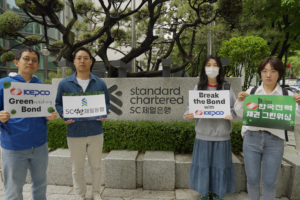Today, the Toxic Bonds Network sent letters to the CEOs of Citigroup, Bank of America, Mizuho and Standard Chartered, calling on the banks to immediately stop facilitating any new bond issuance for Korea Electric Power Corporation (KEPCO), a South Korean state-run power utility that generates 40% of its electricity from coal.
Download the letters:
- Letter to Jane Fraser, CEO of Citigroup
- Letter to Bill Winters, CEO of Standard Chartered
- Letter to Masahiro Kihara, CEO of Mizuho Financial Group
- Letter to Brian Moynihan, CEO of Bank of America
KEPCO relies heavily on fossil fuels and has incurred a total loss of $36.5 billion (KRW 50 trillion) over the last three years amid rising fuel prices. The company depends on bonds as a significant source of revenue to maintain its coal business. As of December 2023, it issued a total of $58.4 billion (KRW 80 trillion) of bonds. Between 2019 and 2024, KEPCO more than doubled its global green bond issuance.
“Without any concrete plans to transition away from fossil fuels, KEPCO’s relentless bond issuance will only last so long. Despite issuing green bonds under the guise of climate action, KEPCO and its generation subsidiaries still only generate 2 percent of its electricity from renewables.”
– Evgeniya Lee, Climate Finance associate at Solutions for Our Climate
The letter underscores the greenwashing risk of KEPCO’s global green bonds. According to KEPCO’s 2023 Green Bond Report, out of $1.6 billion of green bonds globally issued in 2022, there were no records of how $783.4 million was spent or allocated. In 2023, KEPCO’s generation subsidiary came under fire for using $233.7 million (KRW 320 billion) worth of domestic green bond revenue on fossil gas projects.
“This lack of transparency prompted greenwashing complaints to be filed against KEPCO in Korea this March. The legal claim centered around exaggerated and deceptive advertising regarding its global green bond issuances. Financial institutions should carefully consider the potential legal implications and reputational risks associated with underwriting KEPCO’s green bonds. Supporting such bonds could inadvertently contribute to misleading practices and undermine the integrity of their own environmental and social policies and declarations.”
– ,Gwanhaeng Lee, Senior Foreign Counsel at Solutions for Our Climate.
As a result of KEPCO’s continued reliance on coal, major shareholders, including the Dutch APG and Sweden’s AP7, have divested from the utility. Additionally, BNP Paribas, a multinational bank, no longer holds any positions in KEPCO in open-end funds as it fails to meet the bank’s coal policy.
“By underwriting KEPCO’s global bonds, despite the utility’s lack of climate efforts, they are disregarding their own climate commitments and legitimizing greenwashing bonds. They must stop supporting this major coal power producer, which is responsible for almost one-third of South Korea’s emissions,” said Lee.
Banks underwriting KEPCO’s bonds face significant risks. By continuing to support KEPCO, the banks contradict their own public commitments to sustainable practices and expose themselves to potential legal and financial consequences.
Campaigners from Solutions from Our Climate stood outside the offices of Citi and Standard Chartered, urging the banks to stop financing KEPCO.


The Toxic Bonds Network has requested a formal response from each bank by May 8.